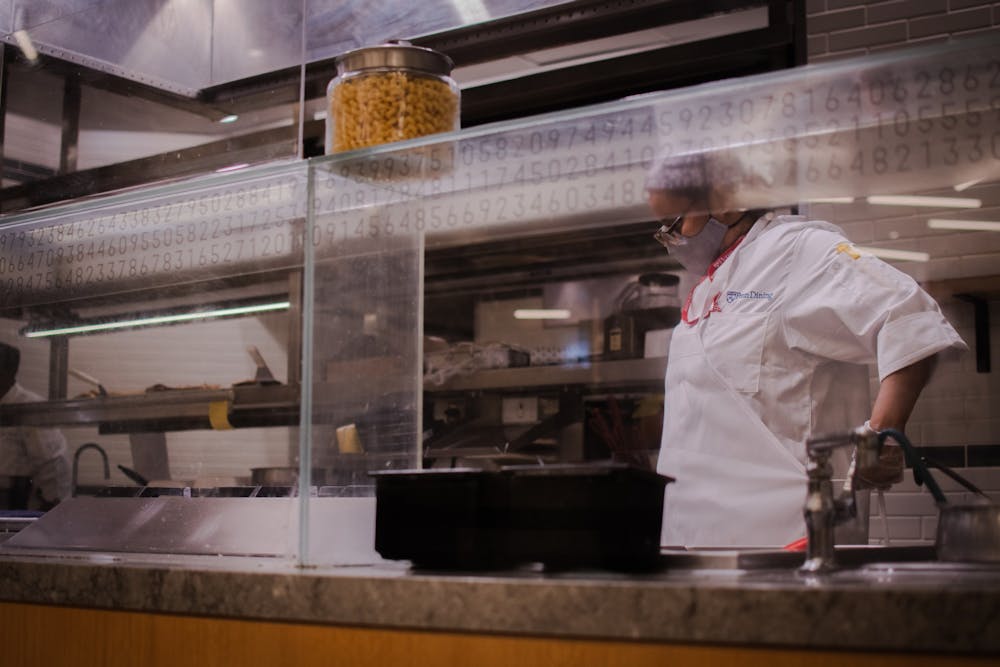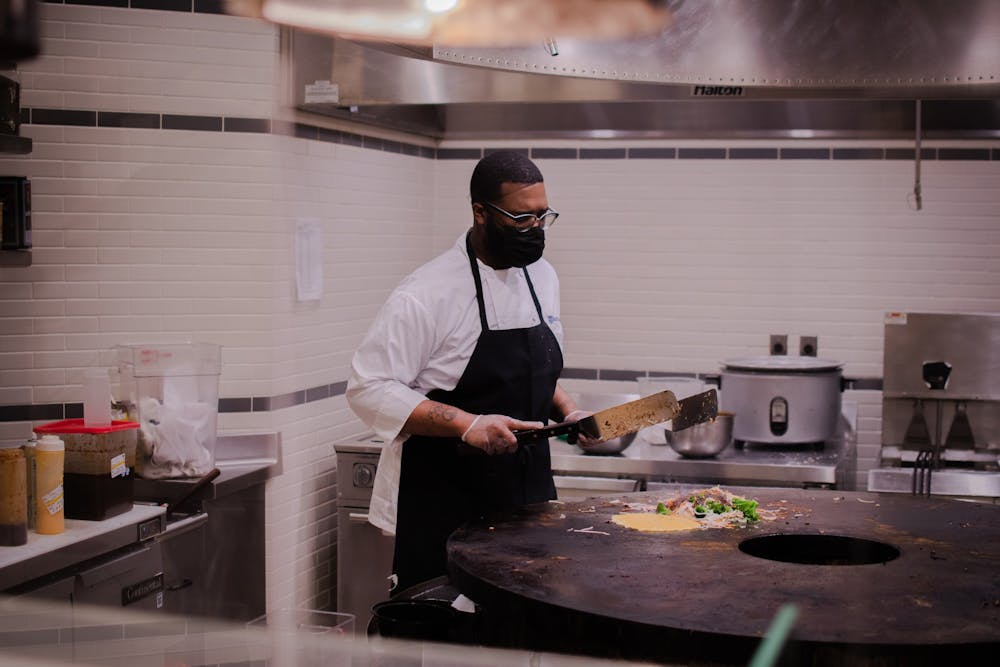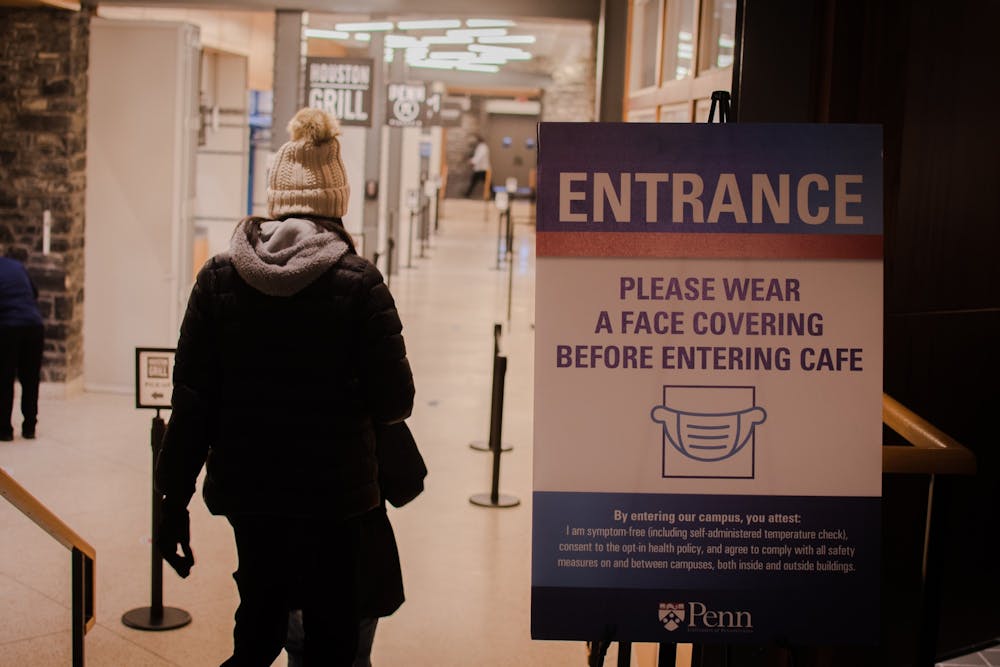
PennPi chef Meseret Brekassa adjusts her apron on Feb 3.
Credit: Max MesterEvery day, a Falk Dining Commons worker serves food to Penn students while thinking about her family at home. She fears bringing COVID-19 back to them — her young child, her elderly parent — which she knows she can't afford to do after she was furloughed by the University for the fall semester. She looks out the window while on the job and sees Penn's COVID-19 testing site, located on the high rise field, just footsteps away.
But, as a subcontracted Bon Appétit dining worker, she's been barred from using it for the past month.
The worker, who requested anonymity for fear of retaliation from Bon Appétit and Penn Dining, is just one of about 100 Bon Appétit dining workers who have spent their workdays at risk of contracting the deadly virus. Now, almost one month after dining employees started work for the spring semester, Penn will allow them to schedule COVID-19 tests starting this week. The move came as a surprise to some dining workers, who were under the impression the University would not test them at all.
“It's kind of like back in the day when my ancestors had to deal with ‘Blacks only’ bathrooms and ‘whites only’ bathrooms, this logic of, ‘you can't use this testing site because you're in that building. You're not a part of the Penn family, even though you're working on campus. You look right at the test site, but you better not step foot in here because you're not welcome,'” the worker said.
Penn Dining employees are able to receive COVID-19 testing at on-campus testing sites, Penn Business Services Director of Communications and External Relations Barbara Lea-Kruger wrote in an email to The Daily Pennsylvanian. But subcontracted dining workers through Bon Appétit — who wear the Penn logo on their chef jackets, perform similar jobs as Penn Dining workers, and staff retail dining locations like Falk Dining Commons and Houston Hall — fall into a loophole. Since they are technically not employees of the University, Penn has denied them access to testing, despite a COVID-19 testing site across the street from their workplace, multiple dining workers told the DP.
“What makes [this delay] even worse is that Penn’s testing center is right outside of our location,” the Falk Dining worker said. "We look at it all day long — we could go down the steps and walk right over."
Lea-Kruger wrote to the DP that Penn will allow subcontracted workers to schedule COVID-19 testing this week — nearly a month after dining cafes began to gradually open on Jan. 10.
“As Bon Appétit staff are not directly employed by the University, numerous technical and logistical steps had to be taken to ensure the systems were set up that will enable them to access the enrollment process. When those elements are complete, these individuals will be able to successfully participate in the testing. This is currently in progress,” Lea-Kruger said in an emailed statement to the DP on Feb. 1.
Until then, workers like Falk Dining Commons chef Troy Harris said they feel powerless in the face of a deadly, highly contagious virus that could quickly wreak havoc over their dining hall.
"I'm really scared because I’ve got a son with a medical condition. So I just take vitamins and try to keep my immune system as high as I can," he said. "Every day, I just pray for the best."

James Wideman prepares a sandwich at Ginger! in Houston Hall.
The decision to begin allowing Bon Appétit workers to enroll in testing was met with confusion from subcontracted dining employees, some of whom were under the impression that Penn would not offer them COVID-19 tests at all.
"Plans for testing Bon Appétit employees began last semester," Kruger wrote in an email to the DP on Feb. 3. "The implementation and communications to the employees has taken a phased approach."
At Falk Dining Commons, employees were only tested for COVID-19 once, following a confirmed COVID-19 case in the building — which took place after they had already started working there, multiple workers confirmed to the DP. But they were denied access to Penn’s testing centers and instead had to go to an off-campus, public testing site. Bon Appétit, not Penn, covered the cost of those tests, the dining workers said.
For many subcontracted dining workers, the lack of communication from Bon Appétit and Penn represents just one aspect of a persistent pattern of mistreatment. Last March, Penn planned to furlough dining workers without pay due to COVID-19, only to abruptly reverse that decision following a student petition that gained over 8,000 signatures. In August, workers learned they were furloughed without pay for another semester from a TV news segment — not their employer. Now, workers feel they are risking their health for a paycheck while Penn refines its testing protocols.
“To be honest, when you've been kicked so many times, and told in so many ways that you're not like [Penn Dining employees], we weren't shocked to be denied [COVID-19] testing. Because that's the treatment we normally get, so it’s just another day,” the Falk Dining worker said.
Frustrated with Penn's plans to delay COVID-19 testing for subcontracted dining workers until at least Feb. 5, the Student Labor Action Project created a petition, which has garnered more than 600 signatures, demanding that workers be tested immediately.
Penn’s decision raises questions about why the workers weren’t getting tested in the first place, petition creator, College senior and former DP staffer Amanpreet Singh said. The nature of dining hall work is conducive to COVID-19 outbreaks, with cooks trying their best to social distance during long shifts in small, overheated kitchens.
“Not only are these workers not being treated fairly or justly, they're also completely stepping up and doing the Penn community a favor by working in these dining halls, by providing students with food and options for dining. It's still a super unsafe environment with [COVID-19],” Singh added.
On a college campus that could be a breeding ground for a large-scale COVID-19 outbreak, Harris said the lack of even one month's worth of testing could have disastrous consequences.
"These are people's lives. It's not no game," he said.
Subcontracted dining workers serve and interact with the same students that Penn Dining workers do, posing the same COVID-19 risk, second-year public health graduate student and clinical research coordinator at the Hospital of the University of Pennsylvania Alicia Jen said. Jen, a signatory of the petition, said that unlike the University, COVID-19 will not discriminate between dining workers. She fears that transmission within a dining hall could spill over into the Penn community without adequate testing measures in place.
“Penn’s decision doesn't make a lot of sense, because from a safety standpoint, of course you'd want to prevent transmission, both from the dining workers to their own communities as well as from students to dining workers and back and forth. Penn should want to test them and prevent those cases of transmission from happening,” Jen said.
Given Penn’s immense testing capacity of roughly 17,000 tests each week, Jen said she doubts that the University did not have the ability to test subcontracted workers last month — especially since Penn closed its testing site at Iron Gate Theatre on Jan. 27 due to low use.

Wearing masks and social distancing are required when entering Houston Hall.
There are currently 105 Bon Appétit employees working in Penn’s dining halls and nine employees working at Bento in Houston Hall, according to Lea-Kruger — a fraction of the student body that Penn tests twice a week.
At other institutions like Northwestern University, which also subcontracts its dining workers through Compass Group, dining workers sounded the alarm over mistreatment. A lack of job protections and stringent attendance policies caused workers to fear retaliation for COVID-19-related absences, according to The Daily Northwestern.
But at Penn, protocols in the event of a positive COVID-19 case do not differ between Penn Dining and Bon Appétit employees, Lea-Kruger wrote.
“As an example, in the event of a positive test, both Bon Appétit employees and Penn will be provided up to 10 days paid time without being required to use their own accrued sick or PTO time,” Lea-Kruger wrote.
It is unclear whether Penn will vaccinate Bon Appétit employees given their subcontractor status, though students like Singh believe that they are essential workers. Penn's COVID-19 Vaccination FAQs state that it is “too early for the University to commit to any timeline for the vaccination of its students, faculty, or staff."
Penn’s alleged missteps regarding COVID-19 testing point to a bigger issue of subcontracting, Singh said. While many Bon Appétit workers are paid under $25 per hour, dining staff employed by Penn make more money despite working similar jobs. Bon Appétit staff also do not receive a college fund with tax benefits or tuition benefits for their children, both of which are included in Penn Dining staff's benefits.
Harris said he hopes that Penn will eventually eliminate subcontracting altogether and hire the Bon Appétit workers as Penn employees.
“We work just as hard as the Penn workers. We just need to be a part of the entity. We've raised families on underpaid wages, right on their campus,” he said.
The Falk Dining employee agreed, adding that dining locations staffed by Bon Appétit employees, like Houston Hall, have won major awards — unlike all-you-care-to-eat locations like 1920 Commons and Hill House.
“I've been working here 16, almost 17 years, and we never get treated the way other dining workers do. We've been dealing with that as far as pay is concerned, we've been dealing with it as far as title is concerned, and even though we're good enough to wear Penn Dining on our uniforms, we're not considered Penn Dining.”
The Daily Pennsylvanian is an independent, student-run newspaper. Please consider making a donation to support the coverage that shapes the University. Your generosity ensures a future of strong journalism at Penn.
Donate






